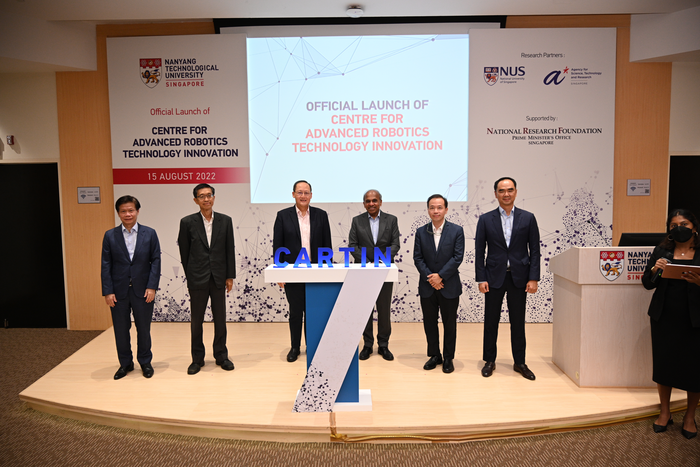Nanyang Technological University, Singapore (NTU Singapore) today launched the Centre for Advanced Robotics Technology Innovation (CARTIN) to develop affordable, safe, and user-friendly robotics technologies that will reinvigorate and reimagine various sectors in Singapore.

Credit: NTU Singapore
Nanyang Technological University, Singapore (NTU Singapore) today launched the Centre for Advanced Robotics Technology Innovation (CARTIN) to develop affordable, safe, and user-friendly robotics technologies that will reinvigorate and reimagine various sectors in Singapore.
Researchers at the S$45 million research centre, led by NTU Singapore, will develop collaborative and human-centric robotics and autonomous system technologies, which will be applied in the areas of logistics, manufacturing, and eldercare. This is in line with Singapore’s Research, Innovation, and Enterprise 2025 plans, in which robotics is one of the national priorities.
CARTIN will see NTU scientists working closely with robotics research entities at the National University of Singapore (NUS) and the Agency for Science, Technology and Research (A*STAR).
The research centre, located on the NTU Smart Campus, was launched today by Dr Tan See Leng, Minister for Manpower and Second Minister for Trade and Industry.
NTU President Professor Subra Suresh said: “The launch of the Centre for Advanced Robotics Technology Innovation (CARTIN) is a timely and natural extension of NTU’s work to add to the existing robotics and autonomous systems research efforts in Singapore and create a critical mass for the development and deployment of ground-breaking and innovative technologies. Expanding NTU’s impact on industry and society by translating inventions and creativity into outcomes that enhance economic benefits and quality of life is one of the key pillars of the NTU2025, the University’s five-year strategic plan.”
NTU Senior Vice President (Research) Professor Lam Khin Yong said: “With a worldwide talent crunch and increasing digitalisation accelerated by an ageing population and the ongoing Covid-19 pandemic, many sectors are turning to automation. The research innovations developed at CARTIN will go a long way in tackling manpower shortage while increasing productivity and efficiency. A unique aspect of the CARTIN is its ecosystem, which allows for close collaboration and involvement of industry partners from the outset to identify industry needs, which in turn fuel the research at CARTIN. This also means that research solutions can be test-bedded, demonstrated, and refined in real-world settings, ensuring a smooth transition as research outcomes at CARTIN are deployed in industry.”
Professor Quek Tong Boon, Chief Executive, National Robotics Programme (NRP) and Co-Chair of CARTIN’S Governing Board, said: “NRP is pleased to have CARTIN as a partner to undertake research and development that focus on the needs of our M&L (manufacturing and logistics) industry. Beyond developing application-driven technologies, CARTIN will also be a valuable platform that can contribute to NRP’s effort to grow a vibrant robotics ecosystem in Singapore in three other dimensions – talent development, enterprise development and greater adoption of R&A (robotics and automation) solutions in our industry.”
Reshaping the robotics landscape
The Centre for Advanced Robotics Technology Innovation (CARTIN) aims to create an ecosystem that brings together research entities with industry partners and public agencies who identify the gaps to be plugged and provide a testbed for these robotics solutions.
Such an ecosystem will allow for basic research to be translated into technologies that can be deployed in industry in a seamless manner.
CARTIN will draw upon the expertise of scientists at NTU’s Connected Smart Mobility Lab, Robotics Research Centre, Centre for Systems Intelligence and Efficiency, and the Centre of Excellence for Testing & Research of Autonomous Vehicles at NTU.
These NTU scientists will work closely with researchers from NUS and A*STAR to develop collaborative and human-centric robotics and autonomous systems for applications in the following areas:
Logistics
Automated guided vehicles, used in shipping ports and warehouses to move containers or goods around, are currently guided by infrastructure-based navigation systems such as magnetic tracks laid on the ground. Such systems are costly and inflexible to install and maintain.
Scientists at CARTIN are looking at how they can develop a novel and robust navigation system for outdoor and indoor autonomous ground vehicles as an alternative.
Manufacturing
Collaborative robots, or cobots, are designed to operate safely side by side with human workers. Cobots can be programmed to perform repetitive tasks such as product assembly and “pick and place” (the process of picking up objects and placing them onto a surface in a set position and orientation).
To increase the productivity of cobots and combine the dexterity of humans with the precision and speed of robots, CARTIN will look at how to develop algorithms and techniques that allow multiple robots and humans to work together in factories to manipulate and assemble parts efficiently and safely.
Eldercare
Robotic companions can help to attend to the social, emotional, and physical needs of an ageing population, allowing the elderly to age independently and easing the load on caregivers. However, the assistive robots that are made for this purpose continue to lack robustness and adaptability in human-centric environments and are unable to have functional physical human-robot interactions.
CARTIN scientists aim to design, develop, and test solutions for embedding such robotic assistants to care for the elderly at home and in clinical settings.
Leading the Centre’s research efforts is Professor Xie Lihua, CARTIN’s director and a professor of electrical and electronic engineering at NTU. Joining him as co-directors are robotics experts Professor Chen I-Ming from NTU and Professor Cecilia Laschi from NUS.
CARTIN is supported by the National Research Foundation, Singapore under its Medium-Sized Centre funding scheme, which seeks to consolidate research activities across departments, faculties, and universities to create a critical mass of leading researchers in strategic research areas for Singapore.
***END***




